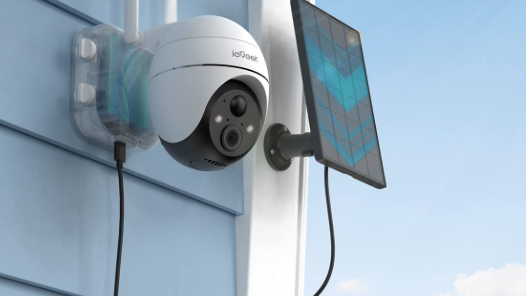
If you live in the UK, you might be wondering where you can legally point your CCTV cameras, and the rough laws around installing security cameras. There are a few grey areas, and it can get a bit technical but today we’re going to try to clear up what exactly you should and shouldn’t point your security cameras.
- So, Where Can I Point My CCTV Cameras?
- Can my CCTV Point at a Main Road?
- Do I Have To Give Someone CCTV Footage If They Request It?
- Do I Have To Follow GDPR Rules If I Have Security Cameras?
- What Can Someone Do If They Don’t Like Where My CCTV Is Placed?
- Conclusion – You Should Try To Record Only Your Property If Possible
So, Where Can I Point My CCTV Cameras?
In short, you are allowed to point your CCTV security cameras just about anywhere on your property, as long as you aren’t deliberately targeting areas where people should expect to have privacy. Examples of this include the inside of other people’s homes and their back gardens.
Of course, this can be difficult to manage if your garden is narrow – it can be impossible to place cameras in a way which records your space without other also monitoring people’s property. Luckily, a load of good wireless outdoor security security cameras have software which allows you to add blind spots or video filters, where the camera won’t record. This is the perfect way to protect your home and respect the privacy of your neighbours.
Can my CCTV Point at a Main Road?
Yes, your CCTV can point at roads. Think of Ring Doorbells – a majority of Brits live on roads, and if we weren’t allowed to have a camera pointed at the road barely anyone would be allowed to install a Ring Doorbell!
I’m in no way able to give legal advice, but think about it this way – in a public place such as on the pavement, people are not expecting to have the same right to privacy as they do in their own private property.
This brings me onto the next question, which is around GDPR and whether surveillance of private property falls under data protection laws.
Do I Have To Give Someone CCTV Footage If They Request It?
In a vast majority of cases, as a homeowner with security cameras you can’t be legally forced to hand over CCTV footage. It is important to note, however, that police may request security camera footage from you for a number of reasons, in which case you should cooperate. Another example of where you may abide by the rules is if a member of the public requests for you to delete footage.
Do I Have To Follow GDPR Rules If I Have Security Cameras?
This is a bit of a grey area at the moment, but recording an area which is outside of your property boundary can mean you need to follow data protection laws. A lot of homeowners don’t follow this advice, but you should try to where possible to keep yourself safe whilst keeping everyone else happy. If you are recording outside of the boundary of your property using a fixed camera (such as CCTV), it’s a good idea to follow these rules:
- Notify people of recording taking place – the easiest way is with signage.
- If a person has been recorded outside of your property boundary, abide by a request by them to have a copy of the footage recorded.
- Automatically delete footage after a certain period of time, usually around a month or so
- Delete footage of people if they ask – generally there wouldn’t be a reason not to agree
- Stop recording a person if possible – this usually isn’t doable, but an example of where this is a nice thing to do is if your neighbour is being constantly monitored in their own garden.
What Can Someone Do If They Don’t Like Where My CCTV Is Placed?
If a neighbour or member of public feels that your use of security cameras could be considered unreasonable, they may make a complaint to ICO about it. Generally, ICO are noted as stating that in most cases they feel it’s difficult to enforce the rules and downright unreasonable to enter a person’s home to check if they have deleted footage of a person.
It’s almost always easier to talk it out face to face and come up with an amicable agreement. It really shouldn’t get to the point where authorities and organisations are having to get involved with CCTV related disputes, and it’s normally easy to avoid taking it this far.
Conclusion – You Should Try To Record Only Your Property If Possible
It can be difficult to fully abide by this and lawmakers have an understanding that it’s pretty hard to have CCTV up which only records your property and nothing else, but it’s considered good etiquette and can save you some headaches if you opt to primarily record the boundaries of your property. This is why it’s unusual to see a security camera pointing straight at a road or pavement and nothing else.
Try to be a good citizen and strike a balance between securing your home and making your neighbours and members of the public uncomfortable. If your cameras are clearly recording a neighbours property, just speak to them and see if you can come to an agreement. If that means filtering out their land and setting up a recording black spot, then so be it.
The wording of “reasonable expectation of privacy” is difficult to fully define, but pointing cameras at other people’s homes is not really a good idea for a number of reasons. In fact, I’ve written an article from the opposing perspective covering whether or not a neighbour can have CCTV pointing at your home, so check that out for more information.
